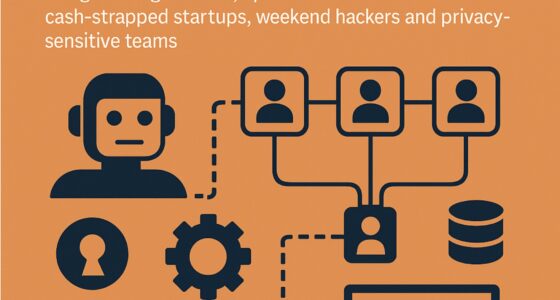AI Mode is changing SEO by making highly specific, context-aware content essential for matching complex user queries. Instead of relying on broad keywords, you need to focus on creating detailed, niche content that addresses precise questions. Personalized results and AI’s ability to interpret intent mean relevance and value matter more than ever. To succeed, adapt your strategies to these new rules—if you keep exploring, you’ll discover how to thrive in this evolving landscape.
Key Takeaways
- AI Mode demands highly specific, niche content that aligns with detailed user queries and intent.
- Traditional ranking signals are less effective; focus shifts to semantic relevance and context-aware optimization.
- Personalized search results favor familiar brands and platforms, making social media and influencer strategies crucial.
- Metrics like impressions and share of SERP become more important than click-through rates in measuring visibility.
- Creating comprehensive, specialized content and understanding evolving user needs are essential for SEO success in an AI-driven landscape.

As AI Mode becomes the new normal in search, it’s reshaping SEO rules in fundamental ways. No longer are broad keywords enough; now, users perform highly specific queries, like “CRM software with email automation for a small team managing global clients,” forcing you to adapt your content strategies. This explosion of search query variations makes it harder for traditional SEO tools to track performance and analytics accurately. Generic content is losing effectiveness because AI Mode excels at parsing detailed, niche-specific questions. To stay relevant, you need to leverage AI-generated insights and monitor Google Trends, ensuring your content aligns with evolving search behaviors. Focus on creating detailed, specialized content that targets specific segments instead of broad topics. AI’s ability to interpret complex queries is fundamentally changing what it takes to rank well and attract targeted traffic. Additionally, understanding content relevance and the nuances of user intent has become more critical than ever, especially as AI models become more sophisticated in evaluating context. At the same time, the role of bottom-of-funnel (BOFU) content is shifting. It must be highly targeted and all-encompassing to rank well in AI-powered search results. AI Mode acts as a research assistant, pulling data from product comparisons, help docs, and roadmaps, which means shallow or generic product pages struggle to appear in responses. Differentiation becomes your advantage—showcasing clear value and unique features helps your content stand out. Instead of purely optimizing keywords, you need to prioritize semantic relevance and passage-level engineering, making your content easily understood by AI algorithms.
Personalized search results are also transforming how your brand appears online. AI Mode tailors results based on individual preferences, behavior history, and even calendar data, creating “echo chambers” that favor familiar brands. This means that relevance to the user’s context is more important than traditional ranking signals. As traffic shifts towards platforms like TikTok, YouTube, and Pinterest for personalized recommendations, you must integrate SEO with social media and influencer marketing to maintain visibility.
Finally, metrics are changing. Rank tracking is less meaningful since AI Mode delivers summarized answers, not just links. New measures like impressions, share of SERP, and organic conversion rates are now essential. Google Search Console will soon include AI Mode data for better attribution. To succeed, your focus must shift from click-based traffic to understanding your visibility in AI-generated responses, emphasizing content quality, E-E-A-T, and relevance. This new landscape demands agility, offering both challenges and opportunities to those willing to adapt their SEO strategies.
Frequently Asked Questions
How Will AI Mode Impact Traditional Keyword Strategies?
AI mode will force you to shift your keyword strategies from focusing on exact matches to prioritizing semantic relevance and context. Instead of chasing rankings, you’ll need to optimize content at the passage level and enhance overall quality. You should also track brand visibility and user engagement metrics, as traditional keyword rankings become less predictive. Adapt your approach to create valuable, all-encompassing content that aligns with AI-generated queries for sustained visibility.
What Skills Do SEO Professionals Need in an Ai-Driven Landscape?
You need to master technical SEO fundamentals like crawlability, indexing, and structured data to guarantee AI and search engines interpret your content correctly. Develop skills in website auditing, optimizing for AI-powered bots, and safeguarding data privacy. Hone your ability to create modular, user-focused content that aligns with AI summaries and featured snippets. Additionally, learn prompt engineering, leverage AI tools effectively, and stay adaptable to evolving algorithms and AI-driven search features.
Will AI Mode Eliminate the Need for Human Content Creators?
AI won’t swallow human creators whole; instead, it acts like a skilled co-pilot guiding your journey. You’ll still craft stories, shape brand voices, and add emotional depth that AI can’t replicate. It automates the dull and repetitive, freeing you to focus on the art of storytelling. Your creativity remains essential, steering the ship through uncharted waters, making humans irreplaceable architects of content’s soul in an AI-powered world.
How Can Small Businesses Leverage AI for SEO Success?
You can leverage AI for SEO success by using tools like Surfer SEO to identify the best keywords and optimize your content structure. Jasper AI helps generate SEO-friendly content quickly, saving you time. Use BrightLocal and SEMrush for local SEO and technical improvements. Regularly analyze your performance with Google Analytics and Search Console, and automate repetitive tasks. These strategies make SEO more affordable and effective, even with limited resources.
What Are Potential Risks of Over-Relying on AI in SEO?
If you over-rely on AI in SEO, you risk producing generic content that lacks originality and doesn’t match your brand voice, which can hurt engagement. It may also cause your rankings to decline due to poor data quality or biased algorithms. Additionally, over-automation can reduce your ability to adapt to new trends and diminish human oversight, increasing the chances of misinformation, ethical issues, and losing your audience’s trust.
Conclusion
Think of AI mode as a master navigator steering you through uncharted waters. The rules of SEO are shifting like tides, but with AI, you’re equipped to sail smoothly into this new world. Embrace the change, adapt your strategies, and you’ll find your way to the treasure chest of higher visibility and engagement. Just remember, in this evolving landscape, those who innovate stay afloat and thrive in the post-search era.









